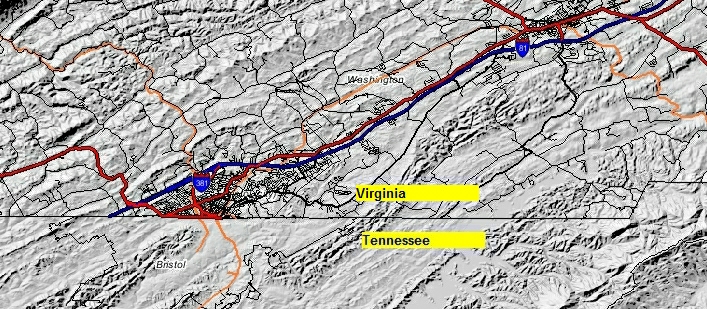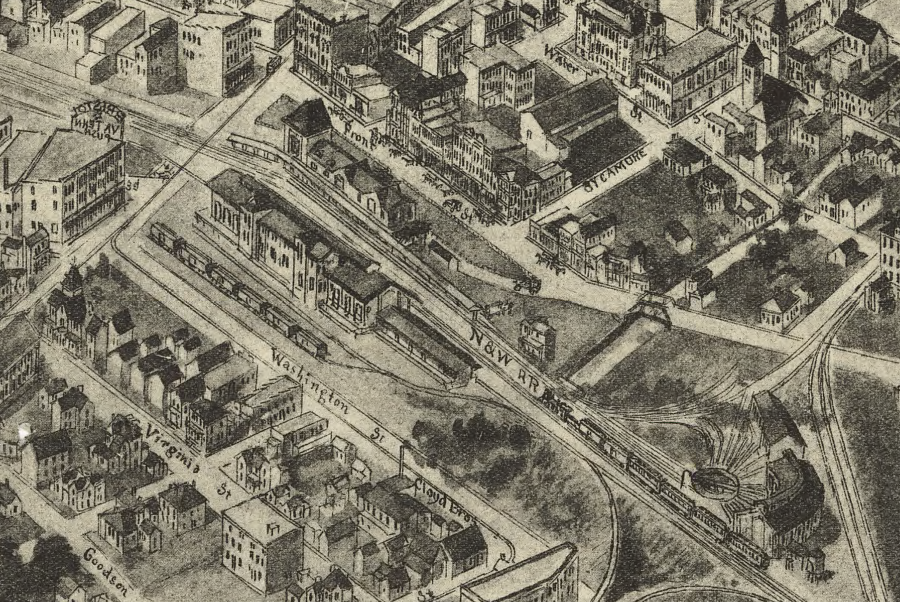
in 1912, the Norfolk and Western Railroad crossed State Street in front of the sign advertising "Bristol VA TENN"
Source: Library of Congress, Aero view of Bristol, Va.-Tenn. (1912)

in 1912, the Norfolk and Western Railroad crossed State Street in front of the sign advertising "Bristol VA TENN"
Source: Library of Congress, Aero view of Bristol, Va.-Tenn. (1912)
Bristol is a two-state city, with separate municipalities in Tennessee and Virginia. An 18th century wagon road, 19th century railroad, and 20th century I-81 cross the border there. The middle of State Street has been the state border since 1901, and wastewater is processed in a facility that is jointly owned by Bristol, Virginia and Bristol, Tennessee. Because the two cities share the same name, there is no Bristol High School; instead, there is a Virginia High School north of the border and a Tennessee High School south of the state line.
The Cherokee controlled the area in the early 1700's, though the Iroquois asserted they had some rights south of the Ohio River. The first colonial settlers arrived before the Loyal Land Company obtained a grant for 800,000 acres in 1749 and Thomas Walker passed through Cumberland Gap in 1750. The French and Indian War deterred settlement after 1754, and the Proclamation of 1763 made it illegal to occupy lands in the watershed of the Gulf of Mexico.
The Treaty of Hard Labor in 1768 made some settlement legitimate west of the Blue Ridge and the 1768 Treaty of Fort Stanwix eliminated the claims of the Iroquois, but the area around Bristol was still restricted to Native Americans by the Proclamation of 1763. The Treaty of Lochaber in 1770 finally authorized settlement at the current site of Bristol.
That 1770 treaty extended the Virginia-North Carolina boundary west to the Holston River, in a line surveyed by John Donelson in 1771 along the 36° 30' line of latitude. The site known variously as Big Meeting Camp, Sapling Grove, and Shelby's Fort - the future site of Bristol - was north of that boundary line. Other settlements south of the boundary concentrated at Watauga and negotiated a lease with the Cherokees to occupy that site.
In 1772, Virginia carved Fincastle County out of Botetourt County, but Colonel Richard Henderson and other speculators in the Transylvania Company tried to establish an independent state in 1775 after purchasing the Cherokee land claim in the Treaty of Sycamore Shoals. Virginia dissolved Fincastle County and created Washington County in 1776, and in 1779 Virginia and Carolina tasked commissioners/surveyors to define the boundary between the two newly-independent states.
When the Virginia and Tennessee Railroad reached the area in 1856, the community on the Tennessee side of the boundary chose the name Bristol in hopes of mimicking the manufacturing center in England. Col. Samuel Eason Goodson started the community on the Virginia side. Goodson, Virginia changed its name to Bristol in 1890, and the city celebrated its 125th anniversary in 2015.
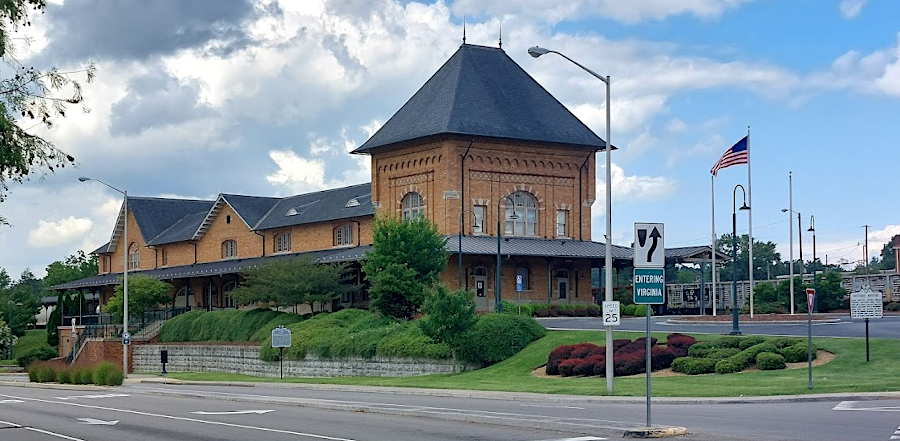
the train station in Bristol is on the Virginia side of the border
The joint slogan, "A Good Place To Live," was adopted in 1921 and is displayed on an illuminated State Street sign next to the train station. That slogan replaced "Push! That's Bristol," boosting the economic development that was underway. When lights burned out on the original sign, it occasionally displayed "PU_ _ That's Bristol," leading to mocking jokes.1
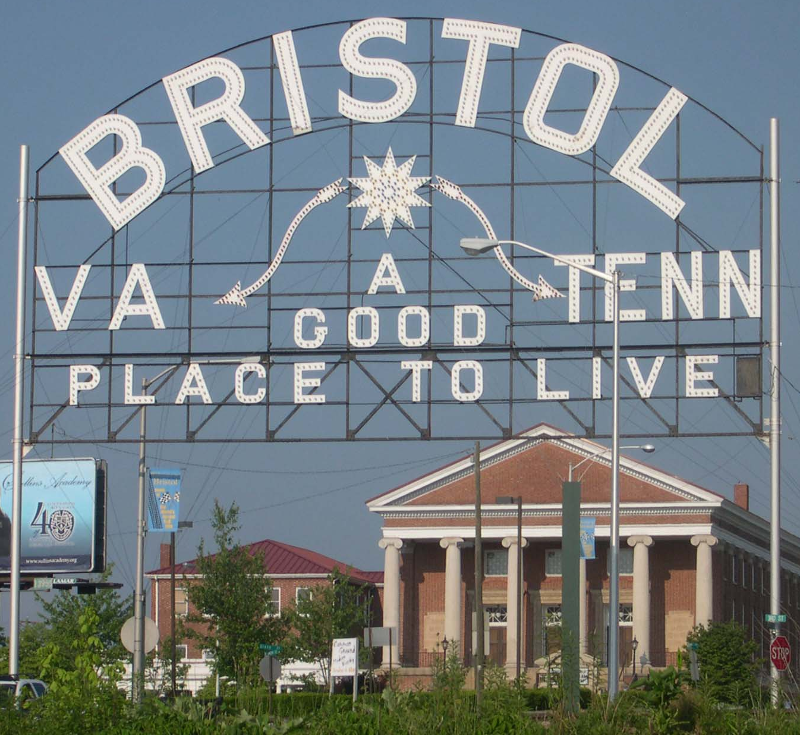
Bristol proudly advertises its location on the border
Source: Wikipedia, Bristol, Virginia
The city recognized early that it needed to make internet services available to improve its economic potential, but at the end of the 20th Century Bristol was too small of a market to attract the internet service providers.
To become "wired," Bristol officials planned, adapted, and then fought for the right to offer telecommunications as well as electricity, water, and sewer as a municipal service. Initially, the city built the infrastructure and laid fiber optic cable in 1999, with enough capacity to support both city agency and public use. Bristol planned for a private sector telecommunications company to use the city-installed capacity to provide "information superhighway" services.
However, no private sector company was willing to tackle the challenge. The 1996 Telecommunications Act limited the city's ability to compete with local telephone companies, but the city refused to be passive. Between favorable court rulings and laws passed by the General Assembly in 2002 and 2003, Bristol went where no one had gone before and ended up as the only municipality in Virginia authorized to provide voice, data, and cable ("triple play") services.2
BVU-OptiNet (the BVU stands for Bristol Virginia Utilities) was launched in 2003 as the "nation's first municipally owned fiber-to-the-premises (FTTP) broadband network offering voice, cable and data services." The city was awarded the "Gold Award for Municipal Excellence" from the National League of Cities in 2008. In 2009, Bristol was designated as one of the Top Seven Intelligent Communities of 2009.3
In 2018-2019, Bristol partnered with neighboring communities in Tennessee and Virginia to define how to rebrand the region, often described as the Tri-Cities for Bristol, Kingsport, and Johnson City. Local leaders, including major corporations such as Eastman Chemical in Kingsport, wanted to attract more people rather than passively watch the population to continue to decline.
The president of the Bristol Chamber of Commerce noted the advantage of wider regional cooperation:4
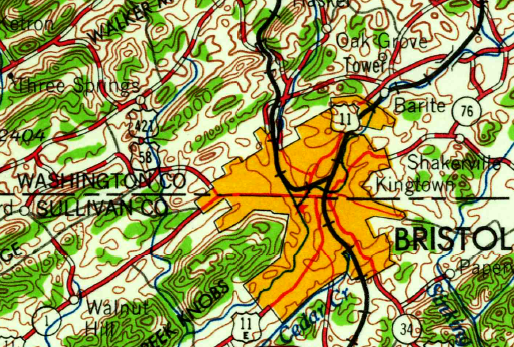
in 1963, before I-81 was built, Route 11 was the main north-south road through Bristol
Source: US Geological Survey (USGS) Johnson City 1x2 grid (1963)
The Bristol Chamber of Commerce highlights how the two cities cooperate rather than compete, claiming:5
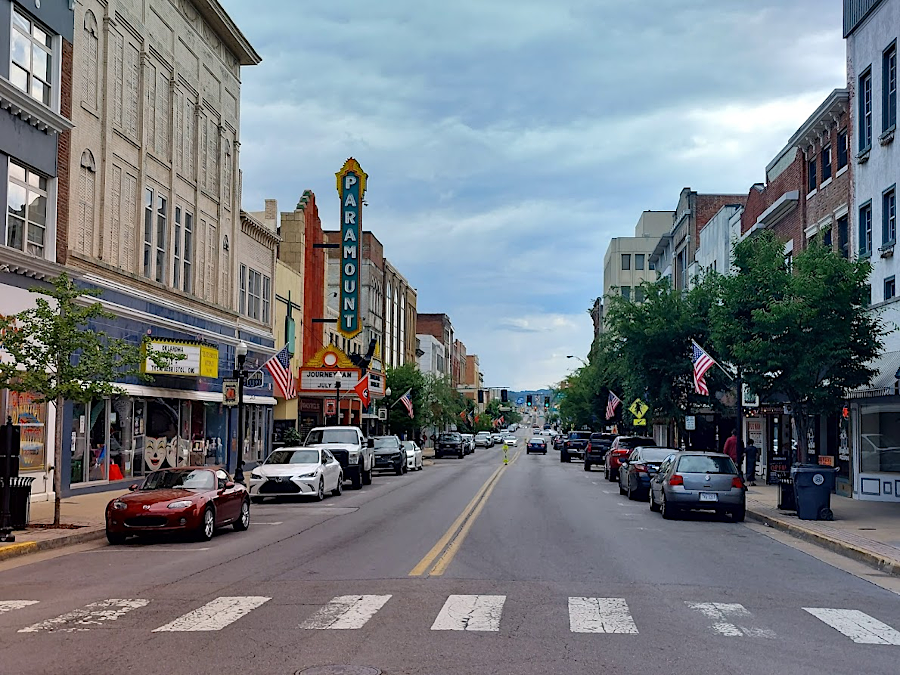
looking west on State Street, where Tennessee flags fly on the southern side of the street
On the Tennessee side of State Street in Bristol, sales tax is higher than on the Virginia side. Tennessee has no state income tax, so it generates revenue from the sales tax.
State Street offers a rare opportunity to walk on a state line. A country music song, "Carrie Brown," highlights the state boundary running through downtown Bristol when discussing how one of her lovers killed the other:6
Source: Steve Earle, Carrie Brown
Both Bristol, Virginia and Bristol, Tennessee contribute funding to three non-profits that attract tourists: Believe in Bristol group applying the Main Street Approach for downtown revitalization, the "Discover Bristol" efforts of the Convention and Visitors Bureau, and the Birthplace of Country Music Museum:7
|
Recipient Believe in Bristol Birthplace of Country Music Discover Bristol |
Bristol, VA contribution (FY19-20) $20,000 $5,000 $125,000 |
Bristol, TN contribution (FY19-20) $50,000 $30,000 $170,000 |
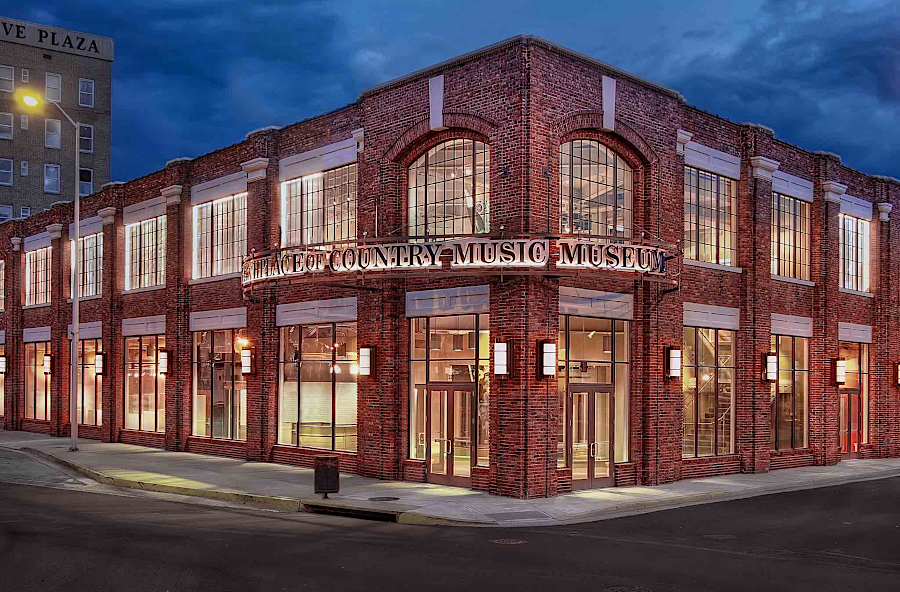
Bristol, Tennessee and Bristol, Virginia both contribute funding to the non-profit Birthplace of Country Music Museum
Source: Birthplace of Country Music Museum
In 2019, the City Council in Tennessee suggested revising the funding formula based on population. Since there were 16,482 residents in the Virginia Bristol and 26,881 residents in the Tennessee Bristol in 2018, the Tennessee city was contributing a higher percentage of the subsidies.
The Tennessee side proposed that each city should contribute an equal share of hotel occupancy taxes. That approach would rebalance the formula based more on economic activity generated by tourism than population. However, Bristol Virginia collected significantly more in hotel occupancy taxes, so the new formula would require the Virginia side to become the primary funder for those non-profits. As an alternative, Tennessee officials also proposed that each city contribute the same amount of money, creating a 50-50 formula.
Bristol's fiscal constraints caused it to lose the local Bristol State Liners minor league baseball team to Tennessee. In 2015, Bristol Virginia declined to join in a feasibility study with Bristol Tennessee and Bristol Baseball to decide how to updated the ballpark at DeVault Memorial Stadium. That facility was on the Virginia side of the state line.
In 2019, the volunteer head of Bristol Baseball was elected to the Bristol Tennessee city council. In 2023, the Bristol Tennessee city council committed $5 million to upgrade a softball field at Whitetop Creek Park 11 miles away in Tennessee to provide a replacement stadium. A Knoxville entrepreneur who already owned four other Appalachian League teams in northeastern Tennessee committed an additional $2 million.
The disappointed Bristol Virginia city manager commented that the Tennessee entrepreneur:8
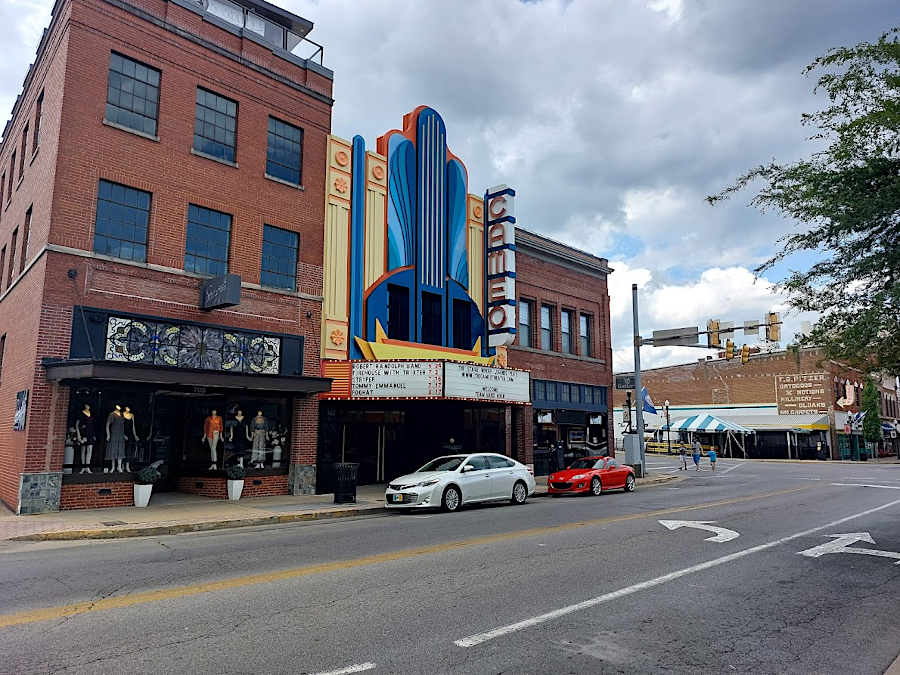
Virginia and the city of Bristol, Virginia collect all the taxes from businesses on the north side of State Street, such as the Cameo Theater hat opened in 1925
In 2017, the Virginia Auditor of Public Accounts identified Bristol as the most fiscally distressed locality in Virginia. The city had sold bonds to develop a landfill and "The Falls" Project on I-81, and the burden of $100 million of debt was high.9
Bristol was authorized by the 2020 General Assembly to hold a referendum to permit opening of a casino. The project was viewed as the key to restoring the city's economic viability, raising tax revenues by as much as 50% by some estimates. The planned Hard Rock Bristol Casino and Resort claimed it could bring in visitors from outside the city, increasing tax revenues rather than just redistributing entertainment expenditures by local residents. Restaurants, hotels, theaters, and other local businesses would see a boost in their revenues. Bristol would see a boost in revenues from existing city taxes on meals, lodging, amusements, and other sales.
City officials and local investors partnered with four other economically-distressed cities in Virginia to get the necessary legislation through the General Assembly. A special provision required that Bristol share its gaming tax revenues (but not other tax revenues) with 12 nearby counties. The creation of the Regional Improvement Commission, which was expected to provide as much as $600,000 annually to each county, enhanced support for the casino legislation from state legislators in Southwest Virginia.10

new tax revenue generated by the Hard Rock Bristol Casino and Resort was expected to help Bristol repay its debt and increase services
Source: Bristol Casino Resort
By 2022, Bristol had cut expenses and started to rebuild a reserve fund. Moody's raised the city's bond rating from Baa2 to A. The city had even managed to retire $2.5 million in long-term costs.11
However, the city was forced to close its landfill. Expectations in 1998 that the city could manage its solid waste by filling in a local limestone quarry backfired. The facility created such a nuisance that the Virginia Department of Environmental Quality (DEQ) forced closure of the landfill in 2022. The city manager estimated closure would cost around $40 million:12
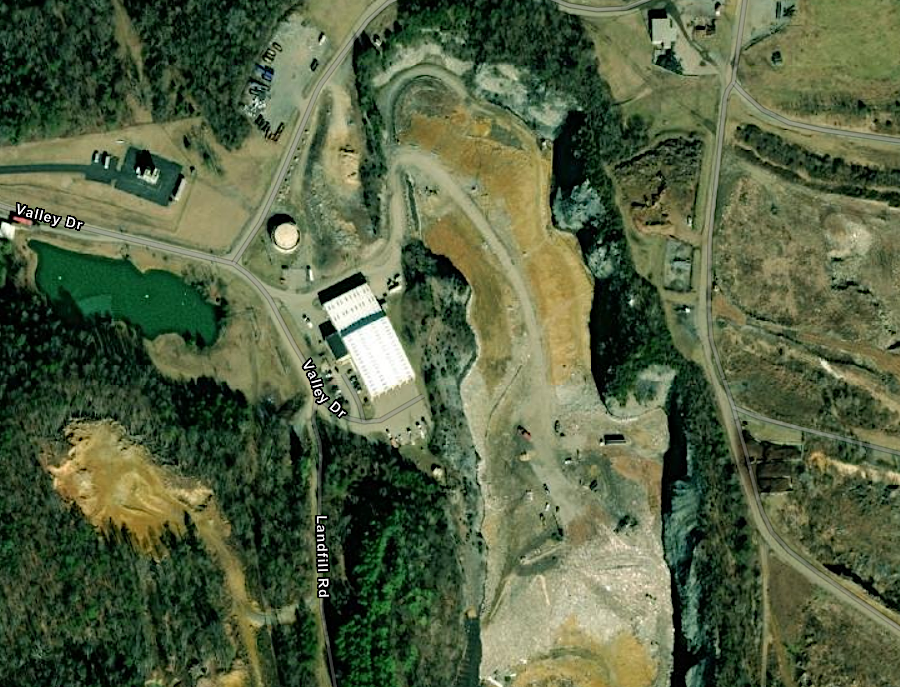
Bristol opened its municipal solid waste landfill in 1998, and had to stop accepting waste in 2022
Source: ArcGIS Online
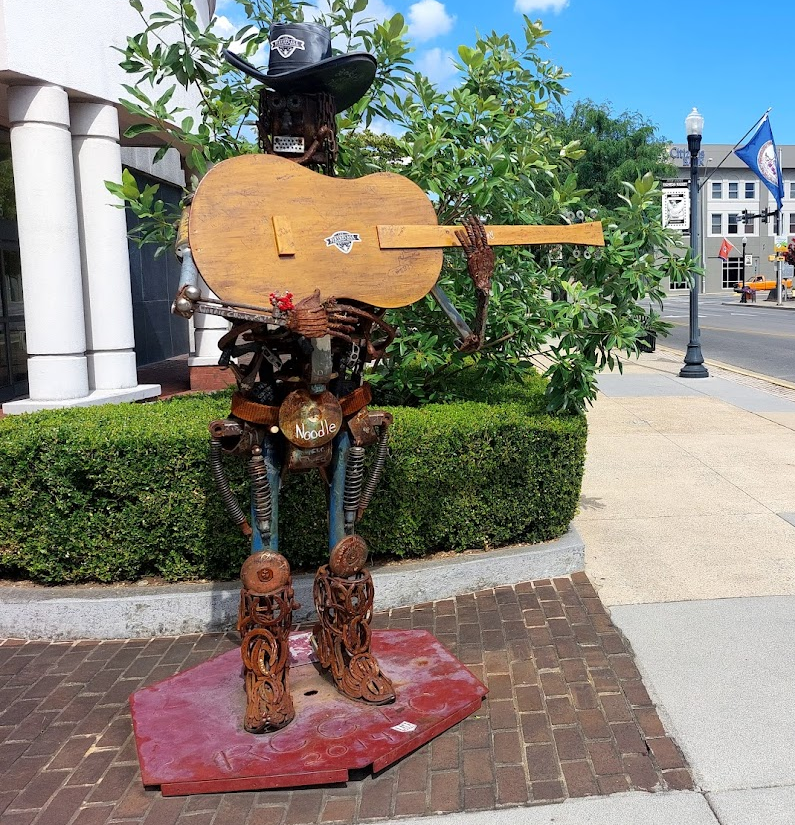
the Victor Talking Machine Company brought a field unit to Bristol in 1927, and those recording sessions are the traditional beginning of country music
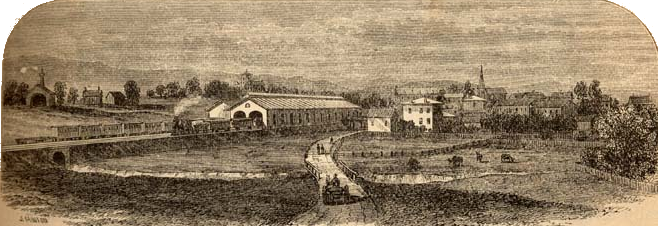
with the arrival of the Virginia and Tennessee Railroad, Bristol became a railroad town
Source: University of North Carolina, The Great South; A Record of Journeys in Louisiana, Texas, the Indian Territory, Missouri, Arkansas, Mississippi, Alabama, Georgia, Florida, South Carolina, North Carolina, Kentucky, Tennessee, Virginia, West Virginia, and Maryland (1875)
